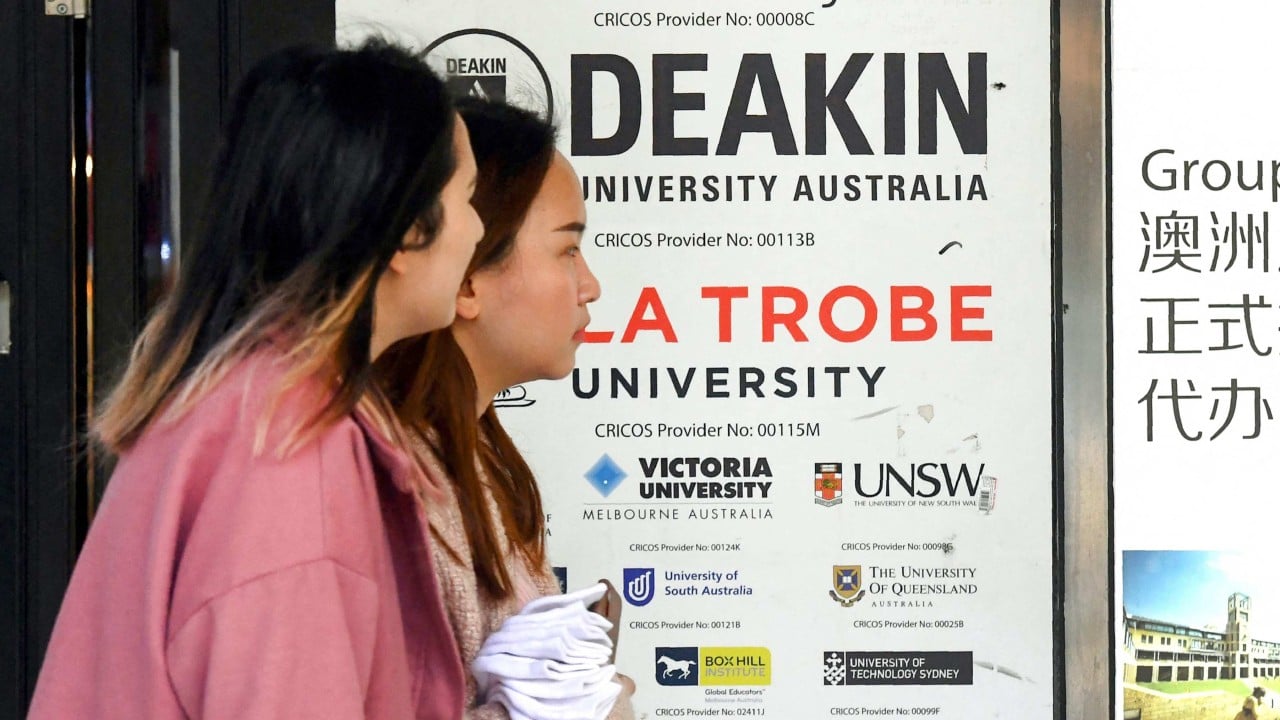Australia could lose its appeal as the top destination for Chinese students to study abroad following Canberra’s decision to cap foreign student numbers, which would be a blow to its A$48 billion (US$32.6 billion) international education sector, analysts and consultants said.
“It will take time for the full impact of [the student cap] decision to play out, but Australia’s reputation as a destination of choice for many international students has undoubtedly suffered a blow,” said David Olsson, national president of the Australia China Business Council.
The decision to cap foreign students, which was announced by Canberra on Tuesday, would limit the number of new enrolments to 270,000 for 2025 as Australia aims to ease record migration levels.
By comparison, Australia received 717,587 new foreign students between January and May, according to official data.
Chinese students ranked first in terms of the number of new international students studying in Australia, with 153,504 new arrivals in January to May, followed by Indian and Nepalese students, according to Australia’s Department of Education.
The new policies would limit the number of international students going to Australia, which will inevitably downsize the number of new immigrants
“International students will not only benefit the education sector, but also the broader visitor economy,” said Olsson.
“The provision of housing, student and family tourism and casual employment in the hospitality sector are all benefits that flow from the study in Australia, and are all impacted.”
Analysis by economists at National Australia Bank suggested that spending by international students accounted for more than half the 1.5 per cent increase in Australia’s gross domestic product in 2023.
The international education sector was Australia’s fourth-largest export industry in 2023, valued at A$48 billion, according to Australia’s Department of Education
“The new policies would limit the number of international students going to Australia, which will inevitably downsize the number of new immigrants,” said Bill Liu, co-founder of Guangzhou Cheuk Yuet Migration Consulting Services.
“It is estimated that many [Chinese] students who originally planned to go to Australia will try to apply for universities in the UK, Singapore and Hong Kong next year that have similar education systems.”
Liu noted that Australia had completely stopped business immigration starting from last year, meaning China’s middle and upper-middle-class families “would have to give up the Australian market”.
The Group of Eight in Australia, which comprises the country’s top-ranked universities, said the “policy was bad yesterday and it is bad today” because “there is no economic modelling on the impact of caps” and “the unexplained [cap] number gives us no comfort”.
James Laurenceson, the director of the Australia-China Relations Institute at the University of Technology in Sydney, explained that the caps were not designed to specifically target Chinese students.
“Rather, the caps target the Group of Eight universities, and because Chinese students prefer to study at these universities, they will be the cohort most affected,” he added.
Karin Zhang, an education consultant for some international schools in the Greater Bay Area, said that they have previously advised parents and students who had applied to universities in Australia and the UK, as well as other Asian countries, to cope with sudden changes in policies.
“Policies on studying abroad in Western countries regarding international students and immigration change often, and they’ve changed much faster in recent years,” she said.
“It becomes much more challenging for Chinese families planning to study and migrate abroad.”
There may be some limiting factors about which institution they can attend
According to the Group of Eight, one in three international students who choose to go to Australia studies at one of its top 100 universities, with almost 80 per cent of Chinese students studying at a university from Group of Eight.
Tan Lin, an entrepreneur in Guangzhou, said she has called off the plan of letting her son apply for master’s programmes in Australia because “it seems that now the opportunities have significantly decreased”.
But Peter Hurley, director of the Mitchell Institute at Victoria University, explained that Chinese students who had already started their secondary school studies in Australia would not be affected if they continued their studies at Australian universities.
“There may be some limiting factors about which institution they can attend,” he added.
“This announcement means … institutions are responsible for managing the limit – and that means there are likely to be less visa rejections and more certainty once a student receives a confirmation of enrolment from a university.”


